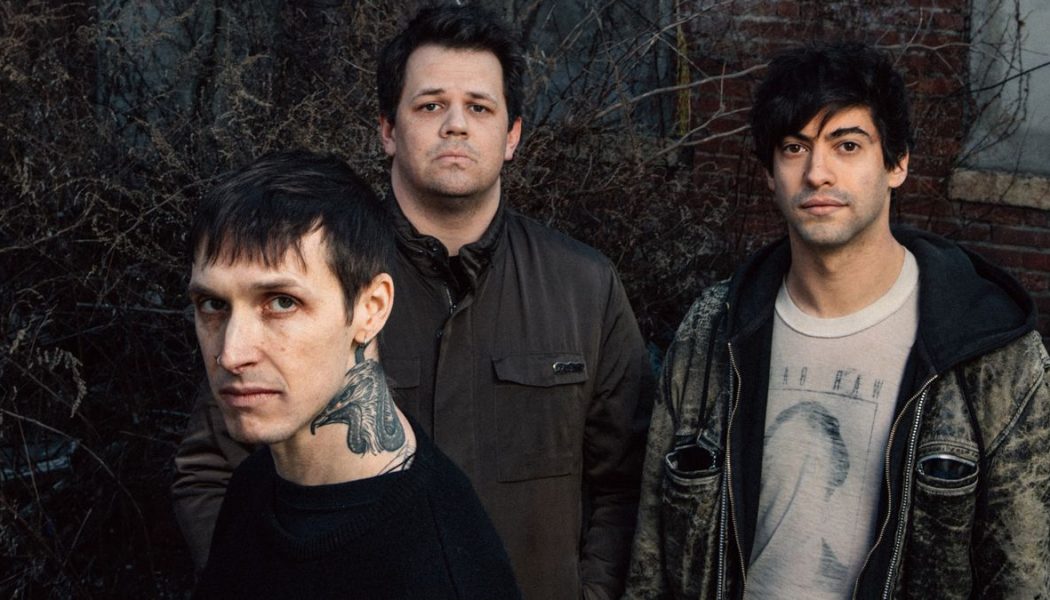
In our Track by Track feature, artists guide listeners through each song on their latest album. Here, Uniform let us in on the inner musings of Shame.
New York City trio Uniform have just released their new album, Shame, a brutal work of heavy music that’s as crushing as it is personal. What’s more, to coincide with today’s release, the band has unveiled a music video for the latest single, “Life in Remission”.
It’s a telling track, following a string of lyrically intense songs such as “Delco” that combine singer Michael Berdan’s passionate, cathartic vocal delivery with a musical blend that veers from dark metal to industrial to harsh noise. Uniform defy any easy pegging, but their focus is honed. Live instrumentation, effects, and synths are woven into cohesive blasts of carefully chosen frequencies.
The engrossing atmospheres of their sonic textures make an ideal palette for Berdan’s words, conjuring time and place in an almost cinematic fashion. Director A.F. Cortes drives home that latter point with a video that “feels filthy, messy, claustrophobic, yet beautiful and contained,” in the director’s own words.
For each new Uniform single leading up to the release of Shame, Berdan included plainspoken and direct comments about the lyrics of each song, revealing his own strifes in the process. Rarely do press releases offer such vivid personal details, but Berdan has been uncompromising, getting to the root of his conceptual ideas with refreshing honesty. It’s one of the reasons we were so stoked on Shame and its palpable realness.
“The lyrics of ‘Life In Remission’ deal with loss, guilt, and the facade of a stable life,” Berdan said. “It’s about the persistent voice in my head constantly telling me that I’m a fraud and urging me toward self destruction. It’s about becoming numb to tragedy. It’s about seeing those around me suffer and die and knowing all too well that it just as easily could have been me a million times over. It’s a song of equal parts anger, regret, and cold despondency.”
With Shame finally given to the world for consumption, Uniform offered Heavy Consequence an exclusive track-by-track breakdown of the new record, which is available now via Sacred Bones or Amazon.
Stream the album, see the band’s track by track breakdown, and watch the new video for “Life in Remission” below.
“Delco”
Singer Michael Berdan: I’d been looking for a way to apply the phrase “you are what you’ve done, you are what’s been done to you” for awhile. Once [drummer Mike] Sharp laid out that opening beat it seemed like an obvious fit. The rest of the song flowed from there. I wrote the lyrics about a group of kids who I grew up with in Upper Darby, Pennsylvania, and how my experiences with them shaped my psyche to this day. While doing research for this song, I discovered that lots of these people were now dead or in prison. Some of these childhood friends wound up making national news for murdering each other in some crazy biker gang drama. Go figure.
Guitarist/bassist Ben Greenberg: This was the first riff that came for this record and I sat on it and messed with it for well over a year before bringing it to the guys. I love the sort of repetition that can become an auditory illusion; that draws the listener into a truly psychedelic state. There are lots of ways to create that cyclical, waltzing feeling but maintain a solid rhythmic grounding and momentum. A phrase that’s rooted in 4/4 and whose total length is an even number of beats, but still indivisible by 4, to me that’s where you can start digging into people’s psyche. In this case the riff is 22 beats long and the two big hits that signal the repetition of the phrase can be felt as either the last two beats or the first two beats. Of course none of this informed the writing of the riff, the riff just came and these are all observations made in retrospect. I think it’s really cool that each of us can be deeply invested in these songs but for completely different reasons. There’s still some common point of relation or attraction, even for us.
Drummer Mike Sharp: I remember Ben having this riff on the Deafheaven tour and we fooled around with it. At first I thought it would be a break-neck half time thing, but once it slowed down to a sort of churning mid-pace, the song’s vibe really comes together. This is an example of a song where less is more. The drumbeat doesn’t really take a break, it’s very simple, and it’s really easy to get caught up in since it locks into a riff with extended phrasing.
“The Shadow of God’s Hand”
Greenberg: So initially all I had for this one was the opening riff, which played out in my head as kind of a start/stop pattern that we could repeat over and over again while Berdan built up to a frenzy. As soon as we got in the same room, though, it became clear that the song was headed in a different direction. Or maybe the same direction but in a different way? I love what [mixing engineer] Randall [Dunn] did with the vocal effects on this one. Space and dynamics are super important to me and one of the biggest reasons I leave space in my writing is to see how it can be filled thru collaboration; to see what people will come up with.
Sharp: We got plodding on this one at the practice space, and actually I don’t remember who came up with the middle section. I know we wanted to change up the dirge that made up the main riff and I think we just jumped into a d-beat to see what we could do with it. I think that part really pulls the song together in a way that takes you up above it and then drops you back into a hole. I love that the siren-noise in the middle part as well; kind of signals when it really gets cruising.
Berdan: I love how this song goes from a slow Crowbar knockoff to a fast Anti-Cimex knockoff and back. Greenberg and Sharp seriously touch on so many of my favorite aspects of heavy music with this track and I couldn’t be more happy with the result. Really glad that they let me include the piercing siren sound and the scream into the d-beat. Lyrics are about the f**ked up places I’ve gotten to during periods of intense insomnia, where anxiety leads to insomnia and then lack of sleep leads to anxiety which leads to further insomnia. Time stands still. The night never ends. It’s very lonely.
“Life in Remission”
Sharp: We started writing this one with the fast blasting/tremolo riff. That took a few tries to really lock in as we were first trying to play it first-wave black metal fast. I suggested we get the blast tempo down to a steady chop. Jensen Ward speed. I think overall we met in the middle on that. We knew we were going to go somewhere with it but the ending wasn’t written ’til the day we were tracking.
I remember we had some noise and electronics ready to go but weren’t sure about the transition. A lot of my favorite stuff on experimental records is when a crossfade really drowns each part of a song and they’re on top of each other for a second so I suggested that for the initial transition to the ending suite. Berdan had these enormous drum hits going during all the swirling electronics, and Ben had the idea to bring the blast back under all of this noise and vocal assault…and using the drum hits as tags for the blastbeat. A hard stop is the way to go after going through something like that. This has become my favorite song on the record, which of course always changes. As I’m writing this though, this is my favorite.
Berdan: We went on a really weird trip with this song. The beginning was way faster and we initially threw in a four-on-the-floor synth pop oriented dance break towards the end. The speed needed to be tapered in order to be something more than an exercise in excess and the dance break was f**king stupid. We spent a lot of time shooting ideas back and forth on how to best glue the song together and in the end, I feel like it very much worked out for the best. The main tempo turned into something workable and the dance part got replaced by a heavy death industrial section that I put together kinda last minute. Really love how Ben and Sharp bring the blasts back for the very end. Randall put some crazy war metal effects on my voice so I sound like a demon, which I’m very happy about. There are a couple of songs on this record where the lyrics are intended as a personification of one’s self hatred & doubt, and this is one of them. Think of a less literal take on Megadeth’s “Sweating Bullets” and you’re there. It’s about someone who has decided to go one way while a bunch of their friends have gone another and wound up dead. It’s pretty sad, I guess.
Greenberg: This song started out incredibly simple on my end, just those two riffs. I figured it’d be cool to have more than one blast-based song on the record, since we’ve never done that before. See if we could explore different sides of the feel, that sort of thing. In my head this song started as kind of a tribute to early-aughts Darkthrone records — Hate Them and Sardonic Wrath in particular — but it didn’t even begin to come to life until Berdan and Sharp got in there. What they both brought to the table pushed this one from a blurry idea into a pretty focused, decidedly scary trip hahah. I always wanted to have a cool fade-back on a song, like “Over the Hills and Far Away”, which is a really hard thing to pull off! Really stoked to see how far we can push this one live.
“Shame”
Berdan: Greenberg had written this kinda post rock riff à la Seam or Hum that we all really liked. I threw some sad sounding synth spaghetti at the wall that wound up being the song’s intro and making the backbone of the verse. The lyrics are pretty self explanatory: A man riddled with guilt slowly drinks himself to death. I pulled inspiration from a few works about middle aged male implosion, namely Sam Peckinpah’s Bring Me the Head of Alfredo Garcia, Will Christopher Baer’s Kiss Me, Judas, and Rod Serling’s Twilight Zone episode “Night of the Meek,” from which I cribbed the line, “That’s why I drink. That’s why I weep.”
Sharp: This felt like such a left-field riff when Ben first brought it. To me, it sounded like Deftones or something, of which I’m a huge fan. I also like that this song actually has a drum machine for me to play along to. It gives it the more artificial sound that defined the band before I joined. The verse parts let me play like I was in a Massive Attack song or something but then we get to explode back into the sort of floating explosive main riff again.
Greenberg: I’ve always loved sus chords (not to be confused with the completely suss chords so many of you are throwing around out there), our track “Ghosthouse” is an example, along with some of the harmony outlined in the chorus of “The Walk”. This is another one that really took shape from what Berdan and Sharp brought in. All I really had was those chords; the intro, verse, verse riff etc all came in Austin once we were all together.
“All We’ve Ever Wanted”
Greenberg: We talked about making this the first track, the lyrics kinda would have made it a perfect fit. This song came together entirely down in Austin, and was really sparked by the initial rhythmic theme. Once I fit some notes to it the second riff came very quickly and naturally, it’s simply a harmonic response: subvert expectations on the first chord and then follow the same structure, but by changing the pacing and length of the phrase, we find a sort of resolution in the final chord (C#) that was initially where we found tension. When we impose extreme compositional limits on ourselves, we are forced to find creative solutions. The results can either be disastrous or incredibly satisfying!
Berdan: This song might have been written entirely in Austin, but maybe Greenberg had the chorus riff before we went down there? I forget. I do remember writing the verse riff while we were eating a particularly delicious dinner at Sharp’s place during a break. I guess it’s the closest thing we have to a noise rock song on this record, with heavy Flipper vibes and a plodding end that could really be extended to infinity. Sharp played the vocal bank from a mellotron underneath the second chorus and that has got to be the single weirdest thing that has ever happened in a Uniform song. Lyrics are about chronic depression and, like Townes said: “Waitin’ Around to Die”.
Sharp: The sort of pounding count as the verse makes this one sort of a build to two separate versions of the same riff. It was Ben’s idea to break down the riff the second time around and the mellotron ended up adding a more haunting feel for it than its noise-rock-ish counterpart earlier in the song. This was an example of something that had more parts but we stripped it down to only parts that work.
“Dispatches from the Gutter”
Sharp: This song is just a meat and potatoes riffer. Verse, chorus, verse, chorus, no bullshit. I’m glad we have a song like this on the record where we’re not trying to stretch our dynamics and textures; but instead just flexing some basic American hardcore chops. Almost nothing feels better than putting an absolute butt-kicker on tape and calling it a day.
Greenberg: Yeah this one is just a flamethrower. The riff came all at once, in one piece, with all the muting and everything. Didn’t have to workshop it at all. It literally sits perfectly under my fingers, and came out sounding natural, at least to me heh. Actually when I first heard this one back from the voice memos on my phone, that was the moment when I knew exactly how I wanted the drums to sound on this record. That kind of big clear powerful but somehow hollow sound, if that makes sense? Anyway whatever it is, Sharp nailed it and Randall perfected it. Berdan’s voice sounds insane on this one too hahah.
Berdan: I think this is maybe the shortest song we’ve ever written. It gets right to the point and pulls no punches. We were trying to figure out a way to build upon Ben’s foundational work for a minute and then suddenly we all realized that the song didn’t need anything extra. In. Out. Done. I pulled lyrical themes from Alan Moore’s Batman: The Killing Joke and some other places. It’s about how fragile the concept of personal stability is and how quickly someone’s life can all go to shit.
“This Won’t End Well”
Berdan: This one was a lot of fun to make. The main dirge riff is something that Greenberg had been working on for awhile. We put together the powerviolence section surrounding that, and I think Sharp really shines here. I bit-crushed the hell out of some kick drum samples which made for some pretty interesting artifacts in between beats. Lyrics are self-referential and about my false martyr complex as well as fears of abandonment.
Sharp: Berdan’s drum samples came before we even tried any work on this one. The delayed cough acting sort of like a drum aftertouch makes for a loose rhythm that we wanted to kind of slog around. I had written the blast-choke sequence as a fun filler, but it ended up working well to cut this song in half. Berdan had the idea to put the bass note around the real Swans-y slow parts and I love how open it feels.
Greenberg: Again, all I had for this one coming down to Texas was the first riff, everything else grew out of us working together, bouncing ideas. Sharp really nails the feel on this one, and picking up to the d-beat section was definitely not something I saw coming hahah. Randall absolutely slayed the mix here too, eh? The low end when that slow riff kicks in, and the vocal fx!
“I Am the Cancer”
Greenberg: I generally sketch out two songs at a time, the contrast between the two helps me define each one. “I Am the Cancer” came along with “Delco” and they were the first two sketches that I came up with for this record. The thrash riff came first, it was originally in some horribly awkward odd time signature which is an old habit that Berdan has tried and failed to break me of numerous times. Riffs just come to me off-kilter, I’m lucky he’s here to help me make them comprehensible.
After a few months of toying with the thrash part, I started to get the structure for the larger blast section in my head. I was hearing this extended, dramatic build with this flowing harmony that would grow and grow and then break into the rowdy part. It took weeks for me to sort out the actual chords I was hearing, and after that, it took the better part of a year for me to figure out how to play it. We don’t have a bass player, so I’m generally holding down bass duties and root notes within whatever guitar riffs I’m playing. This means that all my parts have to serve a dual harmonic function. Because of this, it’s very rare that I get to stray from the lower three strings on my instrument. But I was hearing these operatic upper partials in a higher octave and I had to figure out a way to add a bass note underneath, to ground the harmony and lead towards the next section. Eventually I figured out a minor variation on the tuning I use so I wouldn’t have to turn my hand into a pretzel. Seriously took me until right before we went down to Austin to put the song together. Once we were all in the same room, the second half of the song took shape. It’s one of the only moments on the record where Sharp’s rhythm is dictated by a pattern Berdan wrote on his Elektron Analog 4 — the intro to the song “Shame” is another example. Generally it’s the other way around, with Sharp’s drum parts triggering samples from the Elektron Digitakt.
Berdan: This song right here is probably the centerpiece of the record from which all other songs came. I remember Greenberg working on it back in 2018, which is forever ago given the fact that we didn’t record it until 2020. It’s funny that he mentions the weird timing of the thrash riff in the beginning. I don’t remember that being an issue with this song but stuff like that was a huge bone of contention in our dynamic for years and years. See, Ben is a music-school genius while I am a knuckle dragging hardcore kid. He’s drawn to complexity and gets bored easily. I try to be empathetic to that but not at the expense of the song. I think at this point, we’ve reached a happy medium. Anyway, this is a song about the nature of the voice in my head that urges me towards self-destruction. I always kinda thought of those fucked up thoughts and impulses as things that the character of The Judge from Cormac McCarthy’s Blood Meridian would do, so I decided to use him for the personification of that voice. Most of the words in the song are in reference to things he said in the book. As a matter of fact, the haphazard place holder name for the song that I came up with was The Judge’s quote of “War Endures.” I started hating that title almost immediately but the rest of the band seemed to really like it, which kinda drove me nuts. Sounds like some Snapcase basketball jersey shit that I just can’t get behind. Changed the name to “I Am the Cancer”, which is a line from the beginning of the song. Kinda felt weird about calling it that but then my dad died from cancer shortly after we recorded so I guess I’m good there. I meant for this song title and “Life in Remission” to be metaphorical but it looks like God had different plans. Thanks, God. LOL.
Sharp: This song was another one we’d mess with on the Deafheaven tour during sound check every now and then. The 3⁄4 blast is fun to play with because you kind of have to sit on top of the beat, stay out in front of it. Using drum samples for this one I tried to lag a little when there’d be cymbal tags as that was the only part that wasn’t totally following the strum patterns Ben had come up with, and I wanted this one to have that drum-machine grind sound outside of the thrash break. The riff is very wavey and the blast sort of swims in it like Phantomsmasher or something.
The second half of the song really belongs to Berdan’s vocal performance. Ben and I got to do a lot of melodic stuff. He has a nice arpeggiated finger picked part and a solo, plus I got to play Synth over it. Berdan definitely ties it all together with the repeated lines and the song kind of falling apart around him. I didn’t know this was an album closer til he’d done his take.
Purchase Shame via Sacred Bones or Amazon, and stream the music video for “Life in Remission” below.






![EDM.com Playlist Picks: Calvin Harris, Beyoncé, Tiësto & More [7/29/22]](https://www.wazupnaija.com/wp-content/uploads/2022/07/edm-com-playlist-picks-calvin-harris-beyonce-tiesto-more-7-29-22-327x219.jpg)
![Tobtok, HUGEL and Love Harder Team Up for Lovesick Dance-Pop Anthem, “My Bed” [Premiere]](https://www.wazupnaija.com/wp-content/uploads/2021/03/tobtok-hugel-and-love-harder-team-up-for-lovesick-dance-pop-anthem-my-bed-premiere-327x219.jpg)


